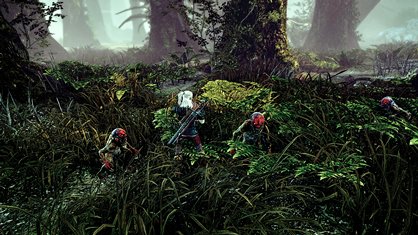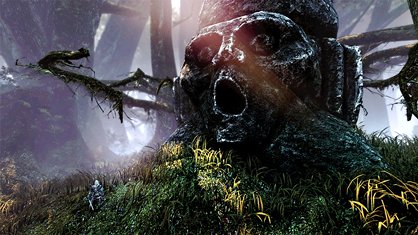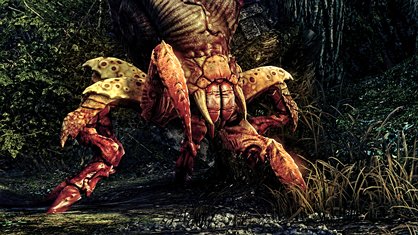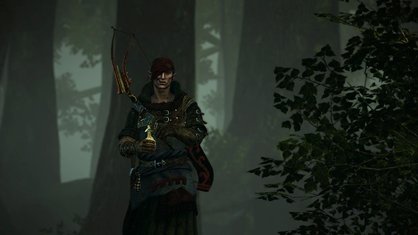How The Witcher 2 intensifies everything
Geralt faces a larger world, a deeper conflict, and harder choices
But the game’s story won’t be taking Geralt back to familiar places – if only because the technology of this game allows for much grander locations. Returning to those of the first title would feel incongruously cramped. “We’re definitely thinking on a much bigger scale,” says Gop, suggesting that a single environment from the first game could fit within one from the sequel many times over. “When you move through different parts of the city you’re not loading between them. And when you walk into an interior you don’t load either. It’s right there when you open the door,” he enthuses.

Even if Geralt steers clear of his familiar haunts, there will be a few familiar faces. Saucy sorceress Triss is a guaranteed fixture, along with Dandelion the Bard and Zoltan the Dwarf. Fans of the books the game was based on should recognise a number of the new names, too. But we’re most interested in how CD Projekt intend to deal with the ladyfolk. Will The Witcher 2 again indulge Geralt’s romantic aspirations in the form of an unsexy collect-a-shag minigame?
“We’ve definitely redesigned the presentational aspects of the maturecontent,” says Gop. No more porno playing cards depicting our conquests, then. But romance remains a big part, with sex and relationships taking on a sophistication that finally justifies the developer's claim of maturity.

“We still believe this part of the game is a way of expressing things as fundamental as combat,” says Gop. He won’t be drawn further, but he has this to say about your interaction with NPCs in general: “The attitude of the people and the societies that you travel through are going to be different depending on the way you choose to progress. But it’s not like particular points in the story make you good or bad with certain groups of people. It’s more like the attitude that you show them when you walk by or when you talk to them.”
CD Projekt’s experience honing the first game has given them plenty to think about regarding ergonomic design. Some of the original’s more tortuous systems have been straightened out, says Gop. “We’ve made the combat system smoother,” he says. “It’s not as visible when you’re changing your combat stance. You had these combo sequences previously, and if you changed stance you had to start the sequence from the beginning. You had to decide first what kind of combat stance you used against certain kinds of opponent.
“We’re trying to do it differently this time. We still have distinct kinds of fighting that you can utilise, and a distinction between fast and strong opponents, but you now have a lot of ways to mix them together without breaking the flow of the combat. You’re not going to break the combo of your strikes if you just mash buttons, but if you want a more tactical approach to the combat, it’s still going to be there. You’ll also be able to combine the keystrokes to add some variety to your combat, using magic or throwing something. There will be a lot of possibilities.”

Similarly, the character progression system has been reappraised. “It has more options, but it’s easier to navigate,” says Gop. “Previously you were developing a lot of separate things: combat styles, magical skills, and so on. We have fewer categories of skill right now, but keep a lot to choose from within those fewer groups.” Potion creation has become less pedantic: it’s now simply a matter of collecting the right ingredients, doing away with the makework minigame in which you boiled it all up. Inventory has been streamlined as well.
Weekly digests, tales from the communities you love, and more
Stripping out The Witcher’s more fiddlesome aspects is a welcome thing, butwe wonder if some of these changes are a side-effect of compromise for console support. Gop is adamant that no change here is detrimental, and that The Witcher 2, though intended for a console port some far flung time in the future, is first and foremost a PC game.
“It’s definitely wise to design an interface keeping the gamepad in mind,” explains Gop. “But considering the easier navigation we’ve implemented, I don’t think we’re compromising anything. We can already plug the gamepad controller to the PC and use it in our game, but we’ve not spent a lot of time on the design interface for the console.”

Blessedly, however, they are spending more time on an English-speaking localisation. Bad news for the developer’s native country of Poland, but the game has been built with English as its primary language – which will hopefully mean that the qualities of its grim folklore-heavy fantasy come through at launch. It’s a sign that CD Projekt have twigged what went wrong for them the first time. Thanks to the months of post-release retrofitting, are they now better prepared to realise the ambitious, genuinely adult RPG that The Witcher so nearly was? Here’s hoping that, this time around, the only edition that they really need to release is the first.
Apr 7, 2010


